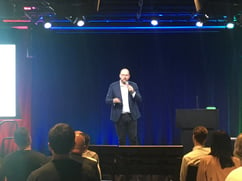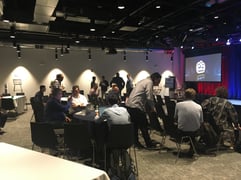"I was at the hotel one morning working at a hospital in Missouri, noticed blood on my t-shirt, and said 'What's that about?'" Sitting at a high-top conference table outside the Boston Common auditorium on the fourth floor of Google's Cambridge, MA office, Michael Preston (

Preston had come to the office for a C2C Connect Live event for Healthcare and Life Sciences professionals in the Boston-Cambridge area. This last question is the same question Preston asked Jonathan Sheffi (
Sheffi agreed: "Working in healthcare and life sciences, no matter what industry you work in, everyone's a patient, and everyone knows some patients." Before he began working in technology, Sheffi was able to experience firsthand what it's like to serve in a patient-facing role. "I was actually a pharmaceutical sales rep early in my career, and met patients who would come up to me and would say, 'your drug saved my life,'" he recalled. "I feel weird taking the credit, because I didn't develop it, I didn't manufacture it, I was just making sure that they had access and had it available to them, but there is nothing quite like meeting a patient who's actually been impacted by your work." Although Sheffi has held executive-level positions at several major tech companies, he has organized his career around the opportunities he sees to serve patients and meet their needs. As he put it, "I'm here because I'm excited about what technology can do for patients."

The program at the event, which included presentations from Sheffi, Google Head of Cloud Sales Engineering Yee-Chen Tjie, Taylor Lehmann, Director of the Office of the CISO at Google, and Luke Ge, an AI Solutions specialist at Intel, and a panel discussion with Ge, Tjie, and Sheffi, was largely technically focused. However, patient experience dominated the conversations that followed, which Sheffi and Preston both cited as a unique value of a community space for HCLS professionals in the tech field. "Another gentlemen talked about his parent, who had cancer," Sheffi recalled. "He had to push for a more medically appropriate treatment option that wasn't initially recommended by the physician."
"Working in healthcare and life sciences, no matter what industry you work in, everyone's a patient, and everyone knows some patients."
Sheffi was referring to Raj Tuliani (
A focus on patient experience is that much more impactful at an event where technical and business professionals are convening to share ideas and make new connections. Once the guests started opening up in the room during the prepared program, they were primed to engage candidly during the networking reception that followed. Making himself vulnerable in front of the others in attendance only made Preston more eager to connect one-on-one with his colleagues and peers. In the middle of describing the security risks his clients in the small- to medium-sized community hospital space face when they don't have resources like a CISO, he caught sight of Lehmann walking past. "I'm going to go hunt him down and talk to him more," he said.
Extra Credit: